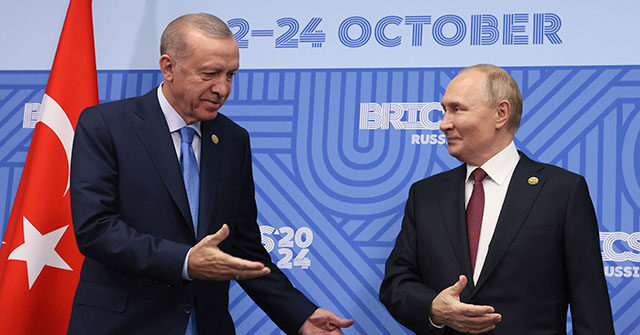Turkish Trade Minister Omer Bolat announced that Turkey has received an offer for “partner membership” in BRICS, the influential economic bloc led by China and consisting of Russia, India, and Brazil among others. This offer was made during Turkish President Recep Tayyip Erdogan’s attendance at the recent BRICS summit hosted by Russian President Vladimir Putin in Kazan, Russia. A key focus of the summit was the establishment of a BRICS digital payment platform, aimed at supplanting the U.S. dollar as the main means of international currency exchange. Bolat emphasized that this “partner” status is intended as a temporary phase within BRICS’s organizational framework, suggesting that full membership may be a potential future outcome. However, this prospect is met with significant concern from NATO, particularly among Turkey’s Western allies.
The BRICS bloc was originally formed in 2009, with South Africa joining the following year, which led to its current acronym. The latest expansion in 2023 invited several countries, such as Egypt, Iran, and Saudi Arabia, with Argentina ultimately declining the invitation. Turkey is now among the 13 nations granted the new “partner country” status, which also includes Belarus, Cuba, and Thailand. Erdogan has previously indicated that mere partner status might not motivate him to pursue full membership, yet he has found value in participating in BRICS meetings to advocate for Turkey’s political interests. The yearning for full membership reflects Turkey’s strategic desire to balance its relationships between BRICS and NATO.
Interestingly, Olmert did not clarify Erdogan’s stance on accepting the current partnership offer. However, Bolat has previously praised BRICS as a counterforce to Western hegemony, reinforcing Turkey’s interest in aligning more closely with the bloc. This enthusiasm stands in contrast to the mixed reactions from existing BRICS members regarding Turkey’s potential inclusion. Notably, India is reportedly hesitant about Turkey’s membership bid, primarily due to Turkey’s ties with Pakistan, India’s long-standing rival. Despite rumors swirling about India’s influence in potentially blocking Turkey’s application, Bolat has firmly rejected these claims, insisting that no veto exists regarding Turkey’s membership aspirations.
Amidst these geopolitical discussions, the reiteration of Turkey’s inclination for BRICS membership can also be seen as a tactical maneuver by Erdogan to leverage competing global alliances. By pursuing a partnership with BRICS, Turkey may be attempting to showcase its growing importance on the global stage, while simultaneously seeking to navigate the complexities of its relationships with NATO and other Western powers. The Turkish trade minister’s comments affirm a desire to embrace new affiliations that might provide economic and political leverage, especially in areas where Western hegemony is seen as an obstacle.
As the dynamics continue to evolve, the prospect of Turkey’s deeper integration into BRICS raises significant questions about the implications for NATO and Western alliances. Turkey’s potential pivot towards BRICS could indicate a broader trend where non-Western powers are seeking new economic partnerships, particularly as they explore alternatives to the existing global financial systems dominated by the West. The focus on a digital payments platform also highlights an increasingly multipolar world, where countries like Turkey are exploring diverse avenues to enhance their economic sovereignty.
In summary, Turkey’s interest in BRICS partnership status signals a strategic shift in how nations are approaching global alliances and economic collaboration. While the offer poses exciting prospects for Turkey, it also underscores the complex interplay between existing geopolitical entities like NATO and emerging powers represented by BRICS. As countries reassess their affiliations in a changing world order, the future of Turkey’s role within BRICS and its implications for international relations will be closely monitored by both its Western allies and rival powers. Ultimately, Erdogan’s decisions regarding this partnership could shape the broader landscape of global diplomacy and economic interaction in the years to come.

